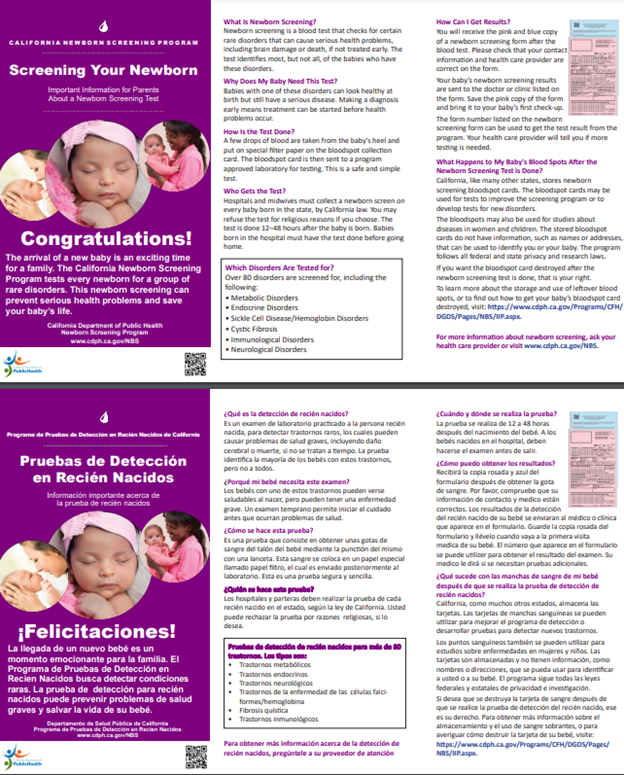California Newborn Screening Program
×
We have modified our process for reporting non-urgent newborn screening test results due to an unexpected contract termination by our printing vendor. As a result, paper results will not be mailed until a contract with a new vendor can be executed. Communication of all positive and urgent cases to providers is unaffected by this issue and continues to take place through the Area Service Centers (ASCs). Here’s what you need to know:
Newborn Screening Results:
- Hospitals are receiving results electronically. If you have a relationship with the newborn’s hospital of birth, please consider obtaining results from the hospital.
- For clinicians who request results via our fax number, we are experiencing a massive increase in requests and have a significant backlog. Providing an email where we can send results will help us in filling your request electronically. However, paper results will not be mailed for the foreseeable future.
Thank you for your understanding during this time.
The California Newborn Screening (NBS) Program is a public health program that screens all babies for many serious but treatable genetic or congenital conditions. About 1 out of every 600 newborns tested in the state will be diagnosed with one of these conditions.
To ensure the health of all its newborns, state law requires that babies born in California have newborn screening soon after birth. A baby's parent or legal guardian may only decline newborn screening if it conflicts with their religious beliefs or practices.
Background
Newborn screening began in California in 1966 with screening for a genetic condition called phenylketonuria (PKU). In 1980, PKU testing gave way to an expanded Newborn Screening Program that screened for PKU and two additional conditions. Since then, the Newborn Screening Program has grown further and now screens for over 80 different conditions, both genetic (passed down in families) and congenital (present at birth).
Goal
The goal of the program is to identify babies with these conditions early, so treatment can be started quickly to prevent or reduce disease.
How it works
Between 12 and 48 hours after a baby is born, an authorized healthcare provider takes a blood sample from the newborn’s heel and places it on a blood spot card, which is sent to a state-contracted laboratory for testing.
Around the same time, the baby receives hearing and critical congenital heart disease (CCHD) screening. The California Newborn Hearing Screening Program helps identify hearing loss in infants and guides families about the appropriate services needed to develop communication skills. The California Critical Congenital Heart Disease Screening Program oversees CCHD screening and can be reached by email at CCHDScreening@dhcs.ca.gov.
Parents who want their baby’s leftover blood spot card destroyed after newborn screening has been completed should complete and submit the “Parent Request to Have Newborn Blood Specimen Card Destroyed” form.
Important Information for Parents
Important Information about Newborn Screening

Cost and billing
Medi-Cal and most other insurance companies cover the NBS Program about 99% of the time.
If your baby was born in a hospital and a blood sample was taken there, the cost is usually included in the hospital bill. If your baby was born at home, you will receive a notice from the NBS Program asking for insurance information. As a courtesy, CDPH will bill your insurance for you.